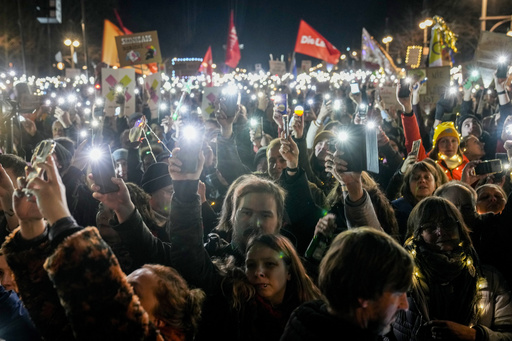BERLIN — The Alternative for Germany (AfD) party seems poised to achieve its most significant national election performance to date this month, positioning itself with a candidate for the chancellorship for the first time. Although it’s unlikely the party will gain any power imminently, it has undeniably influenced political discourse in Germany, particularly regarding migration issues.
First entering the national parliament about eight years ago, the far-right party emerged amidst public frustration over the high influx of migrants during the mid-2010s. While controlling migration remains the cornerstone of their platform, the AfD has adeptly tapped into public discontent over various topics, including Germany’s shift away from fossil fuels, pandemic restrictions, and the nation’s support for Ukraine following Russia’s aggressive actions nearly three years ago.
Founded in 2013, AfD initially focused its efforts on opposing financial bailouts for distressed eurozone countries, measures categorically endorsed by then Chancellor Angela Merkel. Initially labeled a “party of professors,” owing to key early figures, the party nonetheless contained a robust anti-establishment and far-right essence.
Over time, the AfD’s ideology has grown increasingly radical and its leadership has frequently shifted. The party gained significant momentum following Merkel’s 2015 decision to allow a substantial number of migrants into the country. In the 2017 national election, this led to them securing 12.6% of the vote, allowing them to enter the German parliament for the first time.
The party returned to parliament in 2021, albeit with reduced support, garnering 10.3% of the vote. However, they have since strengthened as Chancellor Olaf Scholz’s government faced multiple crises and eventually dissolved.
A year ago, protests erupted in Germany as revelations surfaced about right-wing extremist gatherings discussing mass deportations, including targeting individuals with German citizenship, where AfD members were reportedly present. Despite the backlash, the party’s popularity remained resilient, finishing second in the European Parliament elections last June, and saw a key victory in state elections led by prominent far-right figure Björn Höcke.
Heading into the election on February 23, the AfD is approaching it with bolstered confidence and a radicalized agenda. Alice Weidel, the party’s first candidate for chancellor, has popularized the term “remigration,” advocating for extensive deportations of those lacking legal status in Germany—a term that drew controversy a year prior.
The AfD additionally calls for the immediate reversal of sanctions against Russia and opposes sending military aid to Ukraine. Their vision includes reinstating a national currency and restructuring the European Union into a looser association of nations, though they do not explicitly propose leaving the bloc.
Germany’s domestic intelligence agency monitors the AfD for suspected extremist activities, with branches classified as “proven right-wing extremist” in three eastern states. Though the party vehemently disputes these designations and refutes any connections to Nazi ideology, Höcke has challenged convictions related to his use of Nazi rhetoric at public gatherings.
The AfD claims support from across Germany, sitting in all but two of the 16 state legislatures, with the strongest backing in the economically less prosperous eastern regions. Its unique talent for intensely addressing issues often neglected by other parties contributes to its appeal, especially among younger demographics voting in recent regional elections. This anti-establishment stance resonates during a period of declining public faith in traditional politicians, frequently branding established parties as a “cartel.”
Observers describe the AfD’s role as a “carrier of resentment and anger,” while other political factions often refuse collaboration with the party.
Internationally, the rise of the AfD aligns with a broader resurgence of far-right movements across Europe, including Austria’s Freedom Party and France’s National Rally, sharing similar ideologies. Notably, Weidel’s visit to Hungarian Prime Minister Viktor Orbán underscores these connections. Yet, the AfD remains on the periphery of European far-right coalitions due to past internal tensions that led to their expulsion from previous groupings.
Notably, billionaire Elon Musk has emerged as a vocal supporter of the AfD, openly aligning himself with the party’s mission, asserting that “only the AfD can save Germany.” He has participated in live dialogues with Weidel and made virtual appearances at AfD events, where she echoed the sentiment of “making Germany great again,” a phrase reminiscent of Donald Trump’s campaign slogan.
